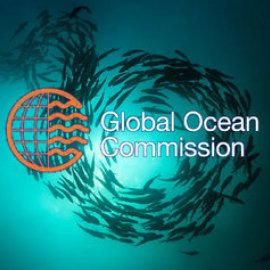Rescue for the Global Ocean, Part I
-
English
-
ListenPause
I’m Peter Neill, Director of the World Ocean Observatory. The World Ocean Observatory was created as a recommendation of the 1998 Independent World Commission for the Future of the Ocean. The final report of that international group of eminent scientists and policy makers was, until now, the most prescient and powerful compendium and call to action for addressing what was then emerging evidence of the decline of the global ocean as a sustainable environment for the benefit of all mankind. This week, however, fifteen years later, comes a new report from a new, somewhat comparable organization, the Global Ocean Commission, with a similar composition and mission. What was concerning a decade ago is critical now. Indeed, the Commission frames the urgency for wide-ranging action within the next five years, an urgent, concentrated program for change that must be implemented and successful if we are to reverse a process, as the Report is entitled, “From Decline to Recovery.” As this plan is so comprehensive and coherent, it must be shared with the public, and as our contribution, we will devote the next several editions of World Ocean Radio to its explanation in some detail and distribution to a worldwide public without whose support these essential recommendations cannot succeed. The Report opens with this statement from the Co-Chairs, “What we found was cause for alarm. The ocean is under threat, and humanity’s approach to it is uncontrolled. Benign neglect by the majority, and active abuse by the minority, have fueled a cycle of decline. No single body shoulders responsibility for ocean health, and an absence of accountability is characterized by blind exploitation of resources and a willful lack of care. We call this the cycle of decline… …The task of saving the global ocean is one that no government or company or individual can achieve alone. Stopping the abusive and unsustainable exploitation of natural resources and freedoms, and restoring ocean health, requires a coalition for change with a clear mission. We are convinced that if the package of eight proposals that we now put forward is expeditiously acted upon, it is possible, within the next decade, to reverse the degradation of the global ocean.” The Report cites five major drivers of ocean decline: 1) Rising Demand for Resources; 2) Technological Advances; 3) Decline in Fish Stocks; 4) Climate Change, Biodiversity and Habitat Loss; and 5) Weak High Seas Governance. The Report makes eight proposals to advance ocean recovery: 1) UN Sustainable Development Goal for the Ocean – Putting a healthy living ocean at the heart of development; 2) Governing the High Seas – Promotion of care and recovery; 3) No More Overfishing – Ending harmful high seas subsidies; 4) Illegal, Unreported and Unregulated Fishing – Closing seas, ports and markets; 5) Plastics – Keeping them out of the ocean; 6) Offshore Oil and Gas – Establishing binding international safety standards and liability; 7) Global Accountability Board – Monitoring progress toward a health ocean; and 8) Creating a High Seas Regeneration Zone. The Introduction continues: “The conclusion we have come to is that the current governance system for the management of human activities impacting the high seas is no longer fit for purpose and cannot ensure long- term sustainability or equity in resource allocation, nor create the conditions for maximizing economic benefits from the high seas. By understanding the drivers of decline individually and together, we have come to understand that what is needed is an integrated rescue package which can deliver ocean restoration when undertaken as a whole. We have considered equity, development and sustainability, and economic as well as intrinsic values. We have thought about the roles of consumers, intermediaries and markets, politicians, direct users and indirect beneficiaries.” These are complicated issues and solutions. Each and every one merits further exposition and discussion; their importance demands that World Ocean Radio address each one in more detail over ensuing broadcasts. These recommendations focus primarily on the immediate recovery of the ocean as habitat and as a global resource that must be protected from past exploitation and outcomes that have brought of us this sad sea state. The solutions are visualized within the architecture of existing structures of governance. That is the only place to start. But these structures have not met the urgency of the challenge to date. Without much expanded public awareness, institutional and individual engagement in the immediacy of the need, and vast political will in support of these actions, this Commission and this Plan may not be adequate to a deadline just five years from today. We will discuss these issues, and more, in future editions of World Ocean Radio.
The Global Ocean Commission released a new report in June, calling for wide-ranging actions over the next five years to reduce the process from decline to recovery. In Part One of a multi-part series, World Ocean Radio host Peter Neill outlines this comprehensive plan, beginning with the major drivers of ocean decline and the Plan’s eight proposals for ocean recovery.
________________________________________________________________________
Peter Neill, host of World Ocean Radio, provides coverage of a broad spectrum of ocean issues from science and education to advocacy and exemplary projects. World Ocean Radio, a project of the World Ocean Observatory, is a weekly series of brief audio essays available for syndicated use at no cost by community radio stations worldwide. Contact us for more information.
Resources from this episode:
< Global Ocean Commission: Final Report
< WORLD OCEAN RADIO: Rescue for the Global Ocean, Part 2
< WORLD OCEAN RADIO: Rescue for the Global Ocean, Part 3
< WORLD OCEAN RADIO: Rescue for the Global Ocean, Part 4
< Global Ocean Commission
- Login to post comments



